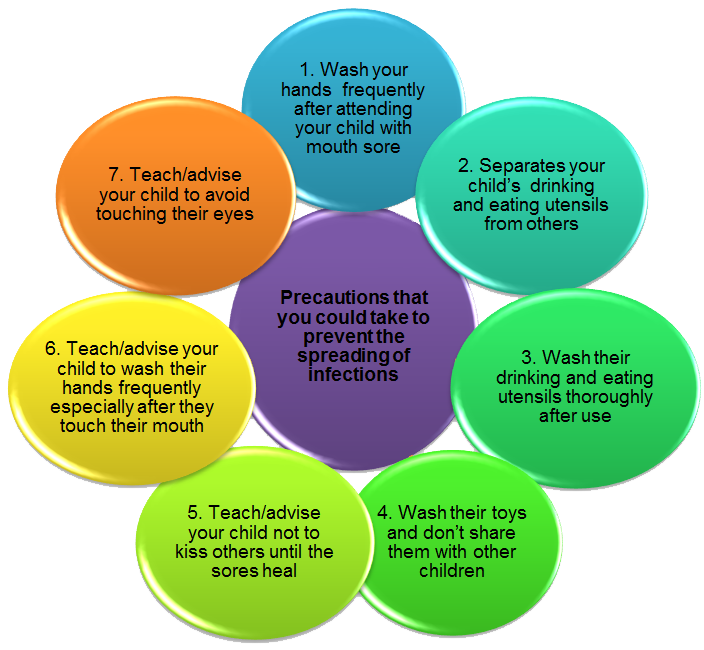Sores in toddler’s mouth can be painful and worrisome. Thus, some toddlers will refuse eating and drinking because of the pain and discomfort. What’s more with cleaning and brushing their teeth?
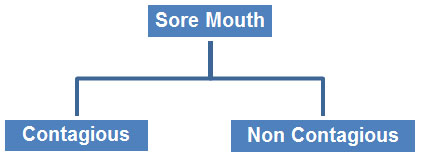
The contagious type is the most common type of sore mouth among toddlers. It usually appears inside the mouth and around the lips area.
The contagious type is also known as
- Cold sores
- Fever blisters.
- Herpetic gingivostomatitis
It can occur in many places inside the mouth such as:
- Inside the cheeks and lips
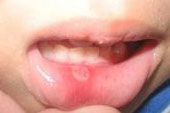 Image Source : health.wikinut.com
Image Source : health.wikinut.com
- Gums area
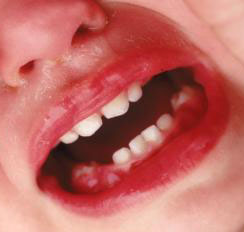 Image Source : www.livestrong.com
Image Source : www.livestrong.com
- The tongue and floor of mouth
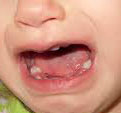 Image Source : Covina.zapcoldsoresaway.com
Image Source : Covina.zapcoldsoresaway.com
- Soft and hard palate
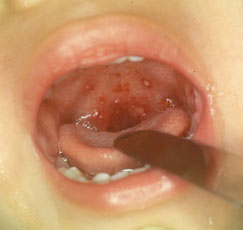 Image Source : Oralherpes.info
Image Source : Oralherpes.info
What Causes Sore Mouths
Sore mouth can be due to either an infection cause or non-infection causes. Sore mouths in toddlers that is caused by an infection are mostly due to viral infection. A non-infectious sore mouth can be due to many factors. The table below shows the possible causes of sore mouth in toddlers.
|
Infective Causes of Sore Mouths |
Non-Infective causes of Sore mouths |
|---|---|
|
|
Signs and Symptoms of Sore Mouths
Signs that you can see if your toddler has sore mouth are as follows:
|
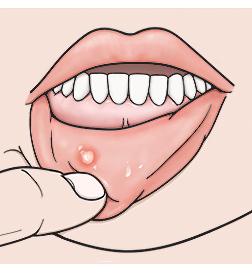 Image Source : http://www.fairview.org/healthlibrary/Article/89369 |
Mouth sore symptoms can include
- Muscle aches
- Eating difficulties
- Pain and Soreness
- Drooling
- Headache
- Generally ill feeling
- Irritability
Bring your child to see dentist/doctor for examination and advice if the followings occur:
- High fever
- Seizure caused by the fever
- Has sores near the eyes or at other sites of the body
- Mouth sore that doesn’t go away within 14 days or repeatedly coming back
- Signs of infection around a mouth sore (pus, drainage and swelling)
- Signs of dehydration (very dark or little urine, excessive thirst, dry mouth and dizziness)
- Your child has other health condition that has compromised the immune system
- Unbearable mouth pain
- Problem during swallowing, eating and drinking
What Can I Do If My Child Has a Sore Mouth?
If the dentist /doctors has diagnosed that your child has the infective type of mouth sores, you must take a few precautions to prevent the spread of infection, as follows :
You can help your child feel better by doing the following:
|
|
||||
| 1. |
|
Giving them soft, cold, liquid diets such as ice cream, milkshakes and jelly. |
|
|
| 2. | Use only soft bristle toothbrush and be careful not to brush hard. If the pain is unbearable you can use soft cloth or cotton ball soaked in mouth rinses to clean your child’s mouth to avoid bacterial infection |
|
||
| 3. |
Ensure your child take enough fluids to avoid dehydration |
|
|
|
| 4. |
Ensure your child gets plenty of sleep and rest as much as possible |
 |
|
|
|
|
||
| 1. |
Avoid feeding your child with hot, hard, abrasive, acidic, salty and spicy food (such as lemons) |
|
| 2. | Using hard bristle tooth brush |
|
| 3. | Neglecting your child oral hygiene |
|
Mouth sores due to virus infection generally go away within 7-14 days with no active treatment. Unless the sores are large and deep, they usually heal without scarring.
Management of Sore Mouths
It is important for the dentist or doctors to rule out other infection or diseases around mouth area that might also present with mouth sores.
Examples of other condition that must be distinguish from mouth sores by dentist or doctors are as follows
- Impetigo (caused by bacterial infection)
- Oral thrush (caused by fungal infection)
- Allergic reaction
- Chickenpox
- Hand, foot and mouth disease (HFM)
- Herpangina (Coxsackie virus infection)
Usually no laboratory testing is required to diagnose mouth sores unless the dentist/doctors suspect your child might have serious condition as listed above. The doctor will diagnose mouth sore in toddler by looking at how the mouth sore appeared in the mouth and history obtained from caretakers or family members.
The dentist/doctors may prescribe your child with
- An antipyretic or analgesic such as syrup paracetamol to reduce pain and to control fever
- A topical medicine to apply directly to the sores
- Tips to apply topical medication – first ensure your child has eaten before applying the medication. Then, clean and blot dry the area with soft cloth or cotton ball. Using a small cotton bud, apply a small amount of the medication and ensure your child doesn’t eat or drink for at least 30 minutes after the topical medication applied.
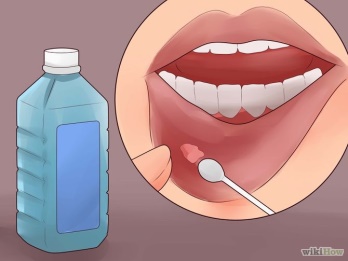 Image source : www.wikihow.com
Image source : www.wikihow.com
- Tips to apply topical medication – first ensure your child has eaten before applying the medication. Then, clean and blot dry the area with soft cloth or cotton ball. Using a small cotton bud, apply a small amount of the medication and ensure your child doesn’t eat or drink for at least 30 minutes after the topical medication applied.
- A numbing gel to relieve unbearable /excessive pain
- A mouth rinse to avoid mouth sore being complicated by bacterial infection because child is unable to brush the teeth as usual
Hospitalisation is rarely needed. However, certain cases of mouth sores might require hospitalisation if it is present with severe signs and symptoms. Hospitalisation is to ensure that the child does not become severely dehydrated due to poor oral intake and to avoid other complication that might arise.
Sore mouth due to viral infection rarely needs an antiviral medication. Your dentist/doctors will determine whether your child require an antiviral therapy or not.
Antibiotics are only prescribed by your dentist/doctors if they suspect your child’s mouth sore is complicated by a bacterial infection.
References
- http://familydoctor.org/familydoctor/en/health-tools/search-by-symptom/mouth-problems-infants-children.html
- http://kidshealth.org/parent/general/aches/canker.html
- http://kidshealth.org/parent/infections/skin/cold_sores.html
- http://www.fairview.org/healthlibrary/Article/89369
- http://www.nlm.nih.gov/medlineplus/ency/article/001383.htm
| Last Reviewed | : | 19 June 2015 |
| Writer | : | Dr. Roziana bt. Abdullah |
| Accreditor | : | Dr. Hjh. Noraini @ Nun Nahar bt. Yunus |


